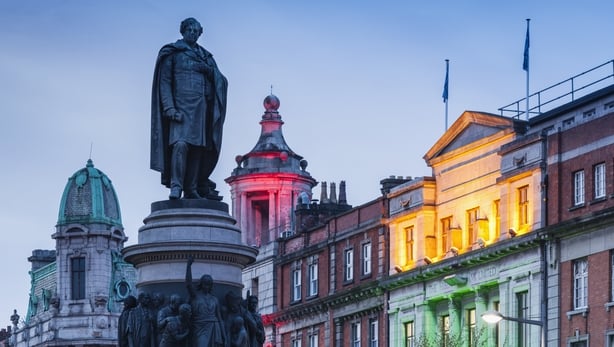Documentary producer Paddy Hayes (Finné, Eipic and Corp + Anam) writes for Culture about his latest two-part documentary film where broadcaster, Olivia O'Leary, re-asseses the life and times of Daniel O'Connell. Watch Daniel O'Connell, Forgotten King of Ireland here via RTÉ Player.
On a trip to Glasnevin cemetery in Dublin five years ago, I was intrigued to visit Daniel O'Connell's mausoleum. But although I pride myself with having more than a passing knowledge of Irish history, I realised I knew only the bare bones about his life. The details behind the monster meetings, the repeal movement and emancipation were extremely sketchy.
Propelled by my ignorance, I set about exploring his story in documentary form and discovered that the last film about O'Connell was made in 1976. Why had nobody tackled his story in over 40 years, I wondered? Was it not dramatic enough?
Once I started researching more thoroughly, though, I discovered that Daniel O’Connell’s life was indeed the stuff of drama.
Director Alan Gilsenan has captured that drama over two parts – his rise and fall - in 'Daniel O’Connell : Forgotten King Of Ireland’. The second of which transmits on RTÉ One on Thursday night and that examines the tragedy of O’Connell’s later years.

He spent his whole life advocating for the power of parliamentary democracy to create change but, when the ageing O’Connell most needed parliament to intervene during the Famine, his pleadings fell on deaf ears. He had become an old Irelander when the Young Ireland movement was ready to consider violent confrontation and sabotage. So is this the Shakespearian tragedy of O’Connell’s life – that he simply stuck around too long and didn’t die as a romantic young man?
As the historian John Borgonovo put it informally to me, by then he was like a Fat Elvis, with his best years behind him, having lost the rock and roll allure of his monster meetings phase. Sick and in debt, he lived long enough to witness his risen people being slain by the great Famine.
Although armed with a great story, I knew I needed a passionate author who could dissolve the mists of time for us and bring us closer to the man. I needed an authoritative figure, one steeped in Irish politics and someone who strongly advocates peaceful democratic politics.
I had often heard broadcaster Olivia O’Leary express her abhorrence of political violence on her podcasts but was also vaguely aware that her grandfather had been in the I.R.A. So I cold-called her, only to discover she had six books on O’Connell on her shelves. Serendipity.
To Olivia, O’Connell was a towering figure who had become lost in plain sight. But I was intrigued to know how she could square her own family’s violent republican past with her endorsement of peaceful progress through parliamentary means. And this scene from the second part of the documentary series about Olivia’s own family history illustrates how her attitude towards violent nationalism has evolved over time.
We need your consent to load this rte-player contentWe use rte-player to manage extra content that can set cookies on your device and collect data about your activity. Please review their details and accept them to load the content.Manage Preferences
For the supporters of violent resistance, O'Connell was a conservative Catholic landlord who failed to lead his people in resistance and rebellion;- a West Brit who scorned the Irish language. To others, he is an Irish Gandhi or Martin Luther King, liberating his people without resorting to the gun. As Dr Fergus O’Ferrall puts it - "That's the greatest story Ireland has to tell, how through moral force and persistent organisation of popular politics, you can bring huge permanent change."
Many others would sit comfortably with a more dissonant attitude towards political violence and think it possible to laud the father of Irish democracy while at the same time celebrating armed insurrection.
When I first started to chat with Olivia about the documentary, she recalled for me a history lesson from her schooldays about O'Connell’s cancellation of a monster meeting at Clontarf in 1843. Her teacher dismissed O'Connell with words along the lines of: "O'Connell is a good man, but when it came to the crunch, he couldn't step up to the plate". Olivia disagreed :- to her, O'Connell was avoiding bloodshed.
That Monster Meeting in Clontarf might be described as a 'moment in time' - a pivotal point in Irish history - and there is much debate about how the course of Irish history changed thereafter. A point debated in another key scene where Olivia O'Leary and Sinn Féin T.D. Eoin Ó Broin lock horns (see above)
It is an impassioned clash of ideologies between two brilliant minds that encapsulates in a single exchange the rise and fall of Daniel O’Connell.
By Paddy Hayes
The concluding episode of ‘Daniel O'Connell : Forgotten King of Ireland’ airs on Thursday, August 29th on RTÉ One at 21.35. Watch Part One here on RTÉ Player.
